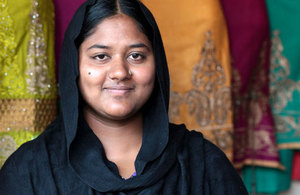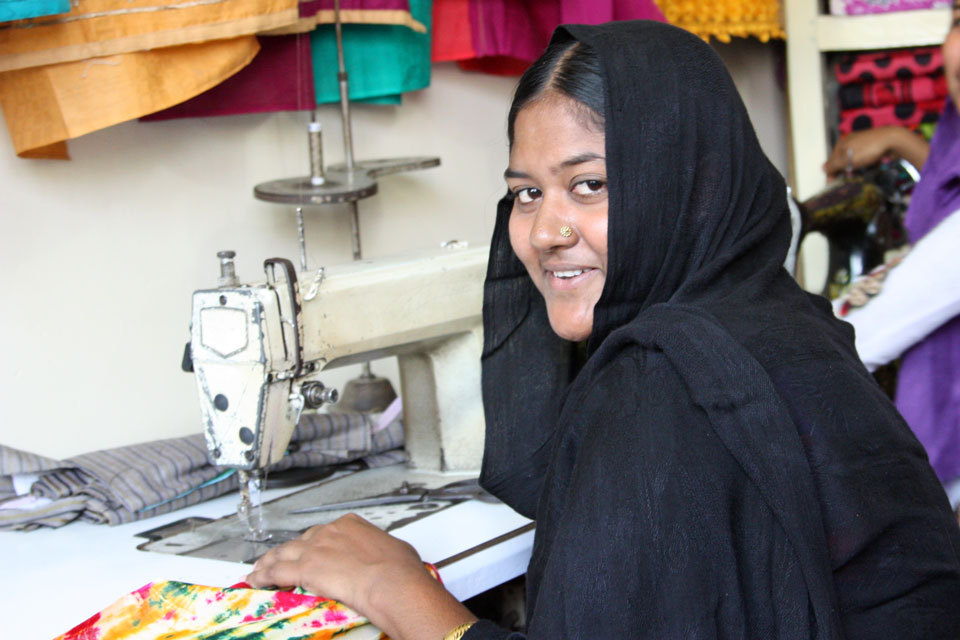A new lease of life: Rana Plaza 1 year on
How UK aid is helping survivors of the Rana Plaza disaster in Bangladesh with medical care, counselling, rehabilitation and practical skills training to earn a new living.

When the Rana Plaza collapsed Khaleda was working there as a line sewing operator. She was treated for her injuries and later on received rehabilitation support from the Centre for the Rehabilitation of the Paralysed (CRP). Picture: Narayan Debnath/DFID
Khaleda Begum works at a tailoring shop in Savar, Bangladesh. Thanks to UK aid from the Department for International Development she attended a 3-month training programme where she learnt how to make dresses. She is now looking forward to setting up her own dressmaking business.
“I want to open my own tailoring shop in the future; ultimately I would like to become self-employed. After the training, my confidence has increased and I have enough courage and experience to manage a shop.”

Thanks to UK aid Khaleda attended a 3-month training programme where she learnt how to make dresses. Picture: Narayan Debnath/DFID
A turning point
A year ago, Khaleda wasn’t so confident or optimistic. She was working as a line sewing operator at a factory in Dhaka and was severely wounded when the building she was working in, Rana Plaza, collapsed.
“There were 10 to 12 of us trapped under the rubble, we thought that we were going to die and we were saying goodbye to each other. I was rescued from the collapse after being buried for 16 hours. My head kept getting stuck in the fallen beams and the rescue team had to dig me out using a shovel.”
Bangladesh’s ready-made garments sector accounts for 80% of the country’s exports and employs over 4 million people, nearly three-quarters of whom are women. It is estimated that the garment industry supports a further 25 million people and has played a pivotal role in the country’s development.
Support for survivors
The Rana Plaza building where Khaleda worked contained 5 clothing factories - most of the people in the building at the time were garment workers. More than 1,100 workers died and over 2,500 were injured, many with life-long debilitating injuries.
Khaleda was taken to Nabinagar hospital where she was treated for her injuries and later on received rehabilitation support from the Centre for the Rehabilitation of the Paralysed (CRP).
UK aid is supporting the CRP to provide medical care, counselling, rehabilitation and support to people injured by the Rana Plaza factory collapse.
The UK is also supporting the International Labour Organisation on rehabilitation and vocational skills training for Rana Plaza survivors. It was thanks to this help that Khaleda was able to complete a 3-month course and train as a dressmaker.
Improving safety and working conditions
Concerns had been raised about the condition of the building before the collapse and it was shut down the day before. The next day workers were assured the building was safe by the building owner and they were compelled to go back into the factories or risk losing their jobs.
The Rana Plaza disaster shone a spotlight on working conditions in the garment industry. Since then the UK has ramped up efforts to improve safety and working conditions and to support people like Khaleda and her colleagues who were affected by the tragedy.
Facts and stats
-
The Rana Plaza building collapse in April 2013 resulted in the deaths of over 1,100 and injury to over 2,500 people.
-
In an in-depth survey that reached 1,500 survivors, most reported sustaining some sort of injury and 35% reported some sort of disability.
-
UK aid announced new support to the ILO’s ‘Improving the Working Conditions in the Ready Made Garment sector in Bangladesh’ programme to help the government of Bangladesh and garment manufacturers to improve safety and working conditions.
-
The ILO is helping the most vulnerable survivors - supporting people who sustained injuries and those who have acquired temporary or permanent disabilities to develop skills and regain employment.
-
This includes helping train the survivors for alternative livelihoods, including through apprenticeships, to provide them with the practical skills they can use to work and/or start their own businesses.
Find out more
For more details of the UK’s work on improving safety and working conditions in the ready made garment sector in Bangladesh read our news story and have a look at our timeline infographic.